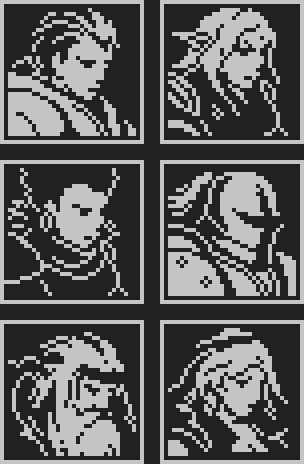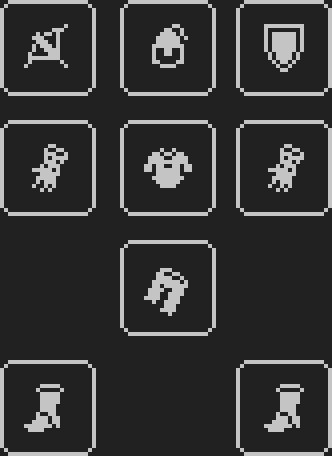CHARACTERS

IMAGE
This is an icon to represent the physical appearance of your character in the game. While we all know not to judge a book by its cover, other characters in the game world might not see it that way and behave differently depending on your character's looks.
COUNTER
Each character card has a row of five counters. These are markers that can be filled in or emptied at the Game Master's (GM) discretion and are used to represent any kind of count the group wants to keep track of during a campaign. A common use might be to represent award points the GM gives a player to spend for extra dice rolls. It’s completely optional and up to the players to use if they wish.

NAME
The title you give your character will be how they are referred to by acquaintances in the game. This can be anything you want it to be.
RACE
The race of your character serves as a narrative guideline for the players. Depending on the world, some races may have common enemies or affinities and in many cases, different races will have physical characteristics that are important for narrative. Depending on the campaign, a different race might also have extra skills and attributes apart from those designated in their class.
CLASS
Every character belongs to a class that defines their specialties. Specific classes will determine the allotment of initial level 1 attribute points (AP) as well as unique starting equipment, items and skills.
If you chooses to create your own class, you may input your initial attribute points yourself as well as create items, equipment and unique skills to start with. The GM can moderate these items and skills before a campaign begins.


 LEVELS AND EXPERIENCE
LEVELS AND EXPERIENCE

Your character has a level that represents the amount of experience they have. In general, this is a level of aptitude that will determine the type of items or spells they can use. It is also a good indicator for the GM as to what types of challenges are a good fit for the players.
All new character’s start at level 1 with 20 AP divided between the their attributes. As the game plays out, the GM distributes experience points (XP) at will. Generally after an achievement or completing a campaign will the GM choose to award experience to characters.
Once a certain amount of experience is reached, your character gains a level and begins progressing to the next level. On some levels, they gain additional attribute points to apply to the attributes of their choosing and may also be awarded a new skill. These levels also offer additional vitality points as seen on the chart to the left.
ATTRIBUTES
Your character's list of attributes determines their proficiency during certain actions. During an action, the player rolls a d20 and adds that value to an attribute relative to the action. The resulting amount determines the character’s successfulness depending on the difficulty of the action.
- STRENGTH
- How much influence a character has over the physical world. Objectives such as pushing over a tree or climbing a ledge might use the strength attribute.
- Melee weapons utilize strength.
- Defending adds a character's strength to their defence.
- FINESSE
- When a task requires a more delicate and focused approach. Things like fixing a mechanism or sneaking past a sleeping dog might use a character's finesse.
- Ranged weapons utilize finesse
- Crafting utilizes finesse
- GRIT
- When a character's inner strength is tested to maintain composure. Something like facing a grotesque monster in battle or watching a companion fall to certain death might requier grit.
- Combat order is determined by adding a character's grit to the result of a d20 roll.
- Healing skills general use grit.
- INTELLECT
- Power of the mind over challenges that require thought and clairvoyance. Efforts like tracking prey or seeing through deceit might require intellect.
- Magic utilizes intellect.
- Crafting utilizes intellect.
- APPEAL
- The kind of influence a character has over another's through their attraction of personality. Persuading a shopkeeper to get a better price or getting on the good side of a potential enemy might require appeal.

VITALITY AND DEFENCE
Every being in a campaign has their own vitality and defence levels. These values are used in combat or whenever a character's mortality is threatened. In general, vitality is used to measure how much damage before death and defence is used to protect vitality by absorb damage.
- VITALITY
- A character's vitality determines how much life they have.
- Each character has a maximum amount of vitality per level.
- Once a character's vitality reaches 0, they die.
- Vitality can be recovered in a number of ways. Examples would be resting in a safe place for a while, using bandages, or perhaps taking a potion.
- DEFENCE
- How much armor and protection a character has adds to their defence level.
- The more defence a character has, the more damage they can absorb before taking vitality damage.
- Character's do not inherently have defence; they will need items or equipment to increase their defence.

 EQUIPMENT
EQUIPMENT

All items in the game may be equipped at the GM’s discretion. As some items need to be equipped to utilize their attributes, characters will often times want to equip items such as armor or weapons to increase their combat or defense attributes.
When something is equipped, it is placed by the player into one of 9 slots on a character. While items are equipped, they are immediately accessible by the character and don’t use an action to utilize.
Usually a character will begin the game with a number of starting equipment and items. These should relate to the characters history and starting level and be moderated by the GM.
Usually a character will begin the game with a number of starting equipment and items. These should relate to the characters history and starting level and be moderated by the GM.
ADORNMENTS
Separate from equipment, the player gets an extra 3 adornment slots to place items in. Similar to equipment slots, active items will grant the character their abilities while in these slots. However weapons and armor may not be placed in the adornment slots. Adornments are more meant to be items like jewels, charms, and other ornaments but anything labeled as an item is suitable for these slots.
INVENTORY
Whenever a character acquires an item and does not wish to equip it immediately, it goes into their inventory. An inventory acts as a character's luggage, storing anything they want to hold on to. Only the items marked as Passive can grant their abilities to the character while in the inventory. Active items must be equipped or adorned to grant their abilities.
SKILLS AND SPELLS
Every character starts out with two skills or spells unique to that character. A skill is chosen by the player and moderated by the GM so the GM should make sure the skill suits the character’s level. By leveling up, the player gains a new skill. Any skill can be chosen but it's suggested that the skill be based on the character’s personality, class, and relevant campaign events. For example, if a character was particularly successful with their hand-to-hand attacks during a campaign, they might develop an extra strength boost while performing strength actions with their bare hands.


If your character is oriented towards magic, you may choose to start with spells instead. Spells are acquired and used in the same way that skills are but may use your character's intellect to determine potency when used. Spells are magical in nature and define themselves by going beyond the bounds of reality whereas skills will utilize a character's physicality or nature. While attacking, spells may be channeled through catalysts such as staves or other weapons. When a catalyst is used for an attack spell, its strength and intellect are added to the spell's potency.
A character may use each of their skills once before invigorating it unless otherwise specified in a skill's description. To invigorate a skill a character must rest for at least 1 hour to invigorate any one particular skill before using it again. While resting, a character goes to sleep with eyes shut and is unable to respond to their senses as normal. A character may also sleep for several hours at a time to invigorate multiple skills.
INVIGORATING
A character may use each of their skills once before invigorating it unless otherwise specified in a skill's description. To invigorate a skill a character must rest for at least 1 hour to invigorate any one particular skill before using it again. While resting, a character goes to sleep with eyes shut and is unable to respond to their senses as normal. A character may also sleep for several hours at a time to invigorate multiple skills.
HISTORY
A character’s history is an important aspect of storytelling. It gives them a presence in the world and can justify motivations and cause for action. Every character should have their own story to tell just as every person in the world has theirs. You may freely input as much description as you want to really enhance your characters urgency in the game. It's also be helpful to have a description or illustration of your character's appearance so other players and the GM have a better understanding.
PERSONALITY
Describing a character’s personality is also important for storytelling. Creating a character and setting them loose on a grand campaign to see how they fair is one of the most appealing elements of an RPG. When a character has a fleshed out personality, it is much easier and more fun to decide how they might react to moment to moment events in the campaign. It is encouraged that you fill out as much of the character's personality as you can.

EXAMPLE CHARACTER

 |

